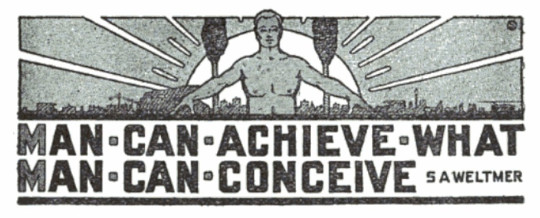Robert Owen? Elbert Hubbard? Orlando K. Fitzsimmons? Sidney Abram Weltmer? O. A. Hawkins? Anonymous?

Question for Quote Investigator: An optimistic rhyming maxim highlights the enormous potential for positive accomplishments. Here are three versions:
(1) What humanity can conceive, humanity can achieve.
(2) What man can conceive, man can achieve
(3) Man can achieve what man can conceive
Would you please explore this adage?
Reply from Quote Investigator: This saying is difficult to trace because it can be expressed in several different ways. The prominent social reformer and socialist Robert Owen employed an instance in the 1845 edition of his treatise “The Book of the New Moral World Containing the Rational System of Society”. Owen emphasized the need for charity, wisdom, and kindness. His book contained a partial match. Boldface added to excerpts by QI:1
It is this spirit and language of truth which must pervade the whole mass and the entire of society, before man can conceive what man can achieve, or society united can accomplish.
Owen used a conditional phrasing. He believed that the principles he extolled would produce a society in which mankind’s positive conceptions would be achieved.
In 1906 a full match for the saying appeared in “Metamorphose: Involving Regeneration of Individual and Race, and Also the Solution of the Great Problem of Poverty” by Orlando K. Fitzsimmons:2
If the conditions existing in the fabled Golden Age can be conceived in the mind of man as a definite Idea, he can attain unto those conditions!
The motto of the new Order is: WHAT MAN CAN CONCEIVE, MAN CAN ACHIEVE.
The Change is at hand!
No attribution is specified for the saying above, and QI believes that currently the originator remains anonymous.
Here are selected citations in chronological order.
Continue reading “Quote Origin: What Man Can Conceive, Man Can Achieve”




